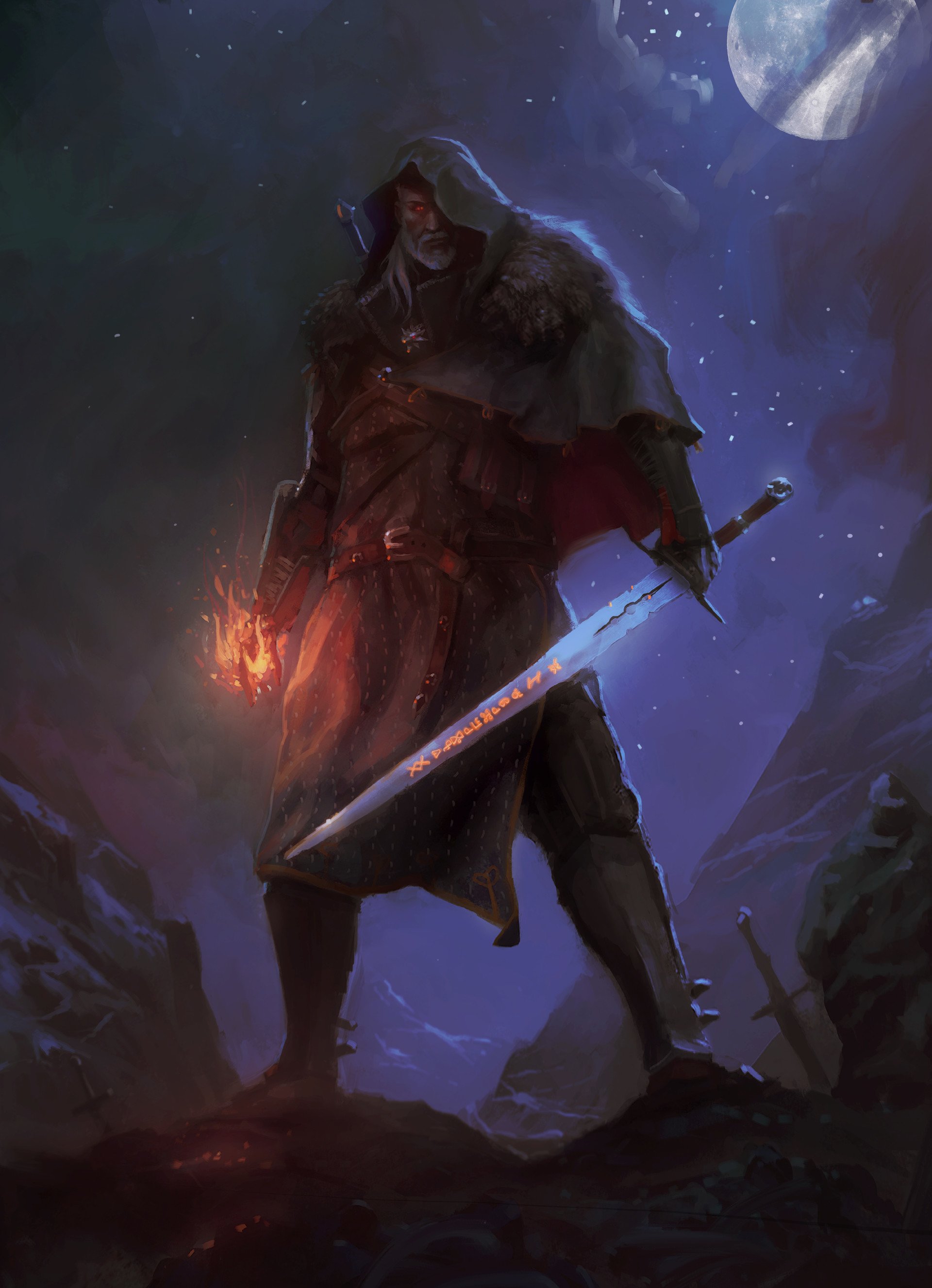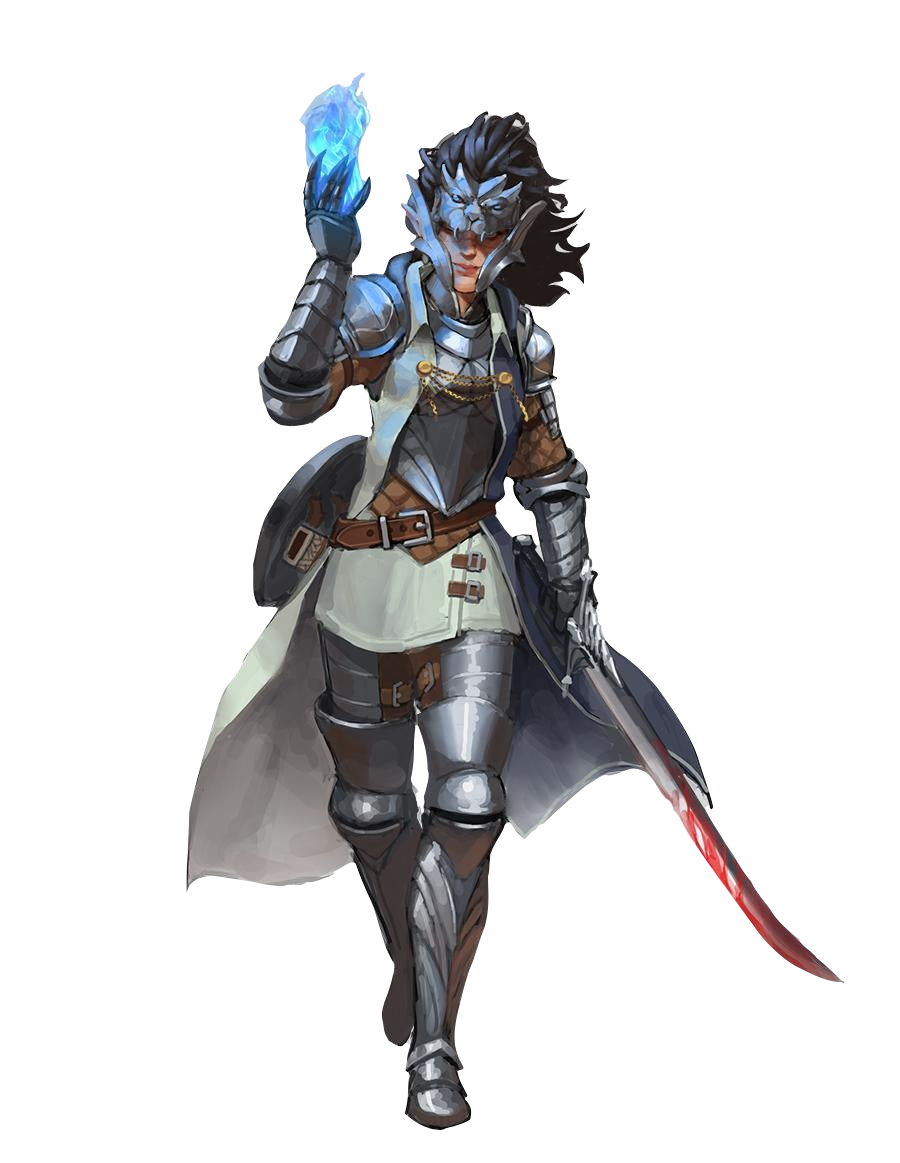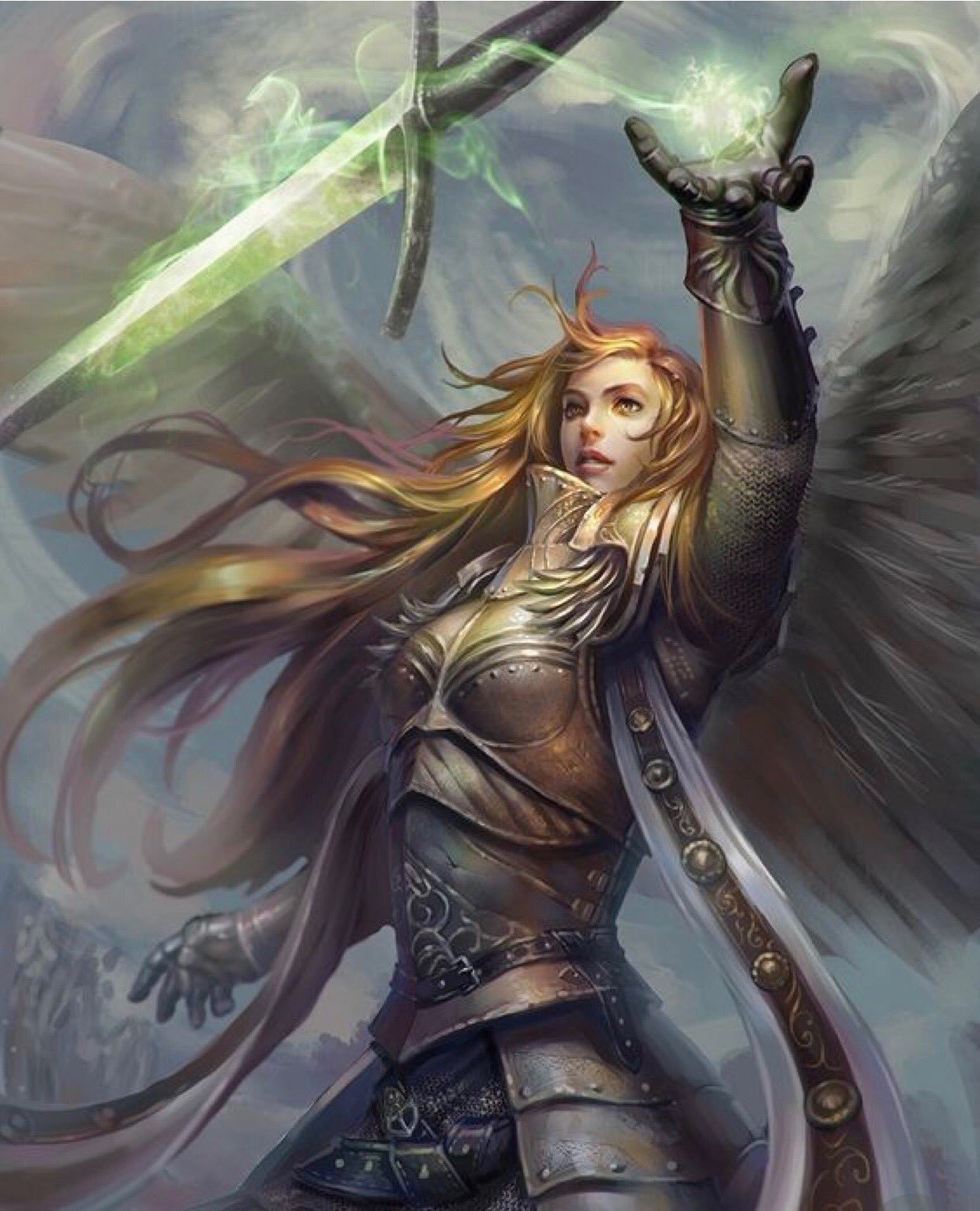
A human walks up behind their half-elf companion, placing a hand on their back. The half-elf's eyes begin to glow with a soft blue light, as they move to disarm the trap ahead of them. The trap then goes off unexpectedly, sending a gout of flame straight for them—but their friend's arcane protection allowed them to survive unscathed.
Holding their sword up high, an elf begins to gather magical energy from the air around them. An orb of fire appears in their free hand, growing larger by the second. Finally, they release it, sending the ball of flame streaking towards their target, an orc just about to strike the princess charged to their care.
A gnome holds a hand crossbow tight as they await the signal from their partner. As their fellow assassin leaps out of the shadows across from them, they discharge arcane energy into their weapon of choice. Once their weapon starts to glow with magical power, they leap out themselves and shoot their prey.
Magi are masters of both spell and sword, arms and the arcane. Much like wizards, they study the arcane, but rather than the arduous magical analysis and scholarly bookkeeping that wizards are prone to, they commit arcane sequences and spells to memory—and focus mainly on magic that can be used in battle. A trained magus is a shockingly deadly force, with powerful destructive and protective magics and the ability to swing a sword and use a shield if all else fails. They have perfected the combination of spells and weaponry, and have formed many orders and disciplines for the focused study of their craft.
Wizardly Warriors
Inspired by traditions such as bladesinging and the fighters known as eldritch knights, a sect of wizards and warriors sought to create a perfect blend of spellcasting and battle techniques. The result are the magi.
A magus' training involves mastering the use of armor and weapons while simultaenously studying magic and committing spell sequences to memory. They do not carry a spellbook, and are instead expected to know their spells by heart through memorization and frequent practice, much like their eldritch knight predecessors.
Arcane Orders
There are many disciplines of the magi, seeking to apply their training as effectively as they can. While there are many ways and traditions a magus might follow, the Six Orders are the primary practices of the magi.
The Six Orders are not institutions in and of themselves, though there are many institutions that teach upcoming magi and may subscribe to the lessons of one of the orders. No, the Six Orders are more like collections of techniques and ideals, and are among the most common such collections among magi as a whole.
Optional Rule: Multiclassing
If your group uses the optional rule on multiclassing in the Player's Handbook, here's what you need to know if you choose magus as one of your classes.
Ability Score Minimum. As a multiclass character, you must have at least an Intelligence score of 13 and a Strength or Dexterity score of 13 to take a level in this class, or to take a level in another class if you are already a magus.
Proficiencies Gained. If magus isn't your initial class, here are the proficiencies you gain when you take your first level as a magus: light armor, medium armor, shields, simple weapons, and martial weapons.
Spell Slots. Add half your levels (rounded down) in the magus class to the appropriate levels from other classes to determine available spell slots.
Class Features
As a magus, you gain the following class features.
Hit Points
- Hit Dice: 1d10 per magus level
- Hit Points at 1st Level: 10 + your Constitution modifier
- Hit Points at Higher Levels: 1d10 (or 6) + your Constitution modifier per magus level after 1st
Proficiencies
- Armor: All armor, shields
- Weapons: Simple weapons, martial weapons
- Tools: None
- Saving Throws: Constitution, Intelligence
- Skills: Choose two from Arcana, Athletics, Acrobatics, History, Investigation, Perception, and Intimidation




The Magus
| Level | Proficiency Bonus | Features | Arcane Power | Imbuements Known | Spells Known | 1st | 2nd | 3rd | 4th | 5th |
|---|---|---|---|---|---|---|---|---|---|---|
| 1st | +2 | Touch of the Magi, Arcane Armory | 1d4 | — | — | — | — | — | — | — |
| 2nd | +2 | Fighting Style, Spellcasting, Arcane Imbuement | 1d4 | 2 | 2 | 2 | — | — | — | — |
| 3rd | +2 | Magical Armaments, Order of Magi | 1d4 | 2 | 3 | 3 | — | — | — | — |
| 4th | +2 | Ability Score Improvement | 1d4 | 2 | 3 | 3 | — | — | — | — |
| 5th | +3 | Extra Attack | 1d4 | 3 | 4 | 4 | 2 | — | — | — |
| 6th | +3 | Power Surge | 1d4 | 3 | 4 | 4 | 2 | — | — | — |
| 7th | +3 | Order of Magi feature | 1d6 | 3 | 5 | 4 | 3 | — | — | — |
| 8th | +3 | Ability Score Improvement | 1d6 | 3 | 5 | 4 | 3 | — | — | — |
| 9th | +4 | Magical Armaments | 1d6 | 4 | 6 | 4 | 3 | 2 | — | — |
| 10th | +4 | Order of Magi feature | 1d6 | 4 | 6 | 4 | 3 | 2 | — | — |
| 11th | +4 | Power Surge | 1d6 | 4 | 7 | 4 | 3 | 3 | — | — |
| 12th | +4 | Ability Score Improvement | 1d6 | 4 | 7 | 4 | 3 | 3 | — | — |
| 13th | +5 | Spell and Sword | 1d8 | 5 | 8 | 4 | 3 | 3 | 1 | — |
| 14th | +5 | Residual Magic | 1d8 | 5 | 8 | 4 | 3 | 3 | 1 | — |
| 15th | +5 | Order of Magi feature | 1d8 | 5 | 9 | 4 | 3 | 3 | 2 | — |
| 16th | +5 | Ability Score Improvement | 1d8 | 5 | 9 | 4 | 3 | 3 | 2 | — |
| 17th | +6 | Magical Armaments, Power Surge | 1d8 | 6 | 10 | 4 | 3 | 3 | 3 | 1 |
| 18th | +6 | Permanent Imbuement | 1d8 | 6 | 10 | 4 | 3 | 3 | 3 | 1 |
| 19th | +6 | Ability Score Improvement | 1d10 | 6 | 11 | 4 | 3 | 3 | 3 | 2 |
| 20th | +6 | Order of Magi feature | 1d10 | 6 | 11 | 4 | 3 | 3 | 3 | 2 |
Equipment
You start with the following equipment, in addition to the equipment granted by your background:
- (a) scale mail or (b) leather armor
- (a) a martial melee weapon or (b) two simple melee weapons
- (a) a light crossbow and 20 bolts or (b) any simple weapon
- (a) a scholar's pack or (b) an explorer's pack
- (a) An arcane focus or (b) a component pouch
Touch of the Magi
At 1st level, you learn how to harness magical energy to protect your allies. As a bonus action on your turn, you can touch a willing creature and expend a use of this feature.
When you do so, the target is marked by your Touch of the Magi for the next minute. While marked, that creature can end this feature on themselves (no action required) when they make a saving throw against a spell or magical effect to roll a d4 and add the result to the roll. This die changes as you gain magus levels, as shown in the Arcane Power column of the Magus table.
You have a number of uses of this feature equal to your proficiency bonus, and you regain all expended uses when you finish a short or long rest.
Arcane Armory
Also at 1st level, you can forge a magical bond with weapons and armor. Over the course of an hour, you can perform a binding ritual between you and one weapon, shield, or suit of armor. The item must be within your reach throughout the ritual, at the end of which you touch it and forge the bond. This ritual can be performed during a short rest. You must be proficient with the item in order to bond with it.
You cannot be disarmed of bonded weapons and shields, and bonded armor cannot be removed from your body, unless you are incapacitated. Bonded weapons count as magical for the purposes of overcoming resistance and immunity to nonmagical attacks and damage if they are not magical already. Finally, it takes an action to don or doff bonded armor and shields.
You can only have a number of bonded items at a time up to your Intelligence modifier (minimum of 1). If you attempt to bond with an item over that limit, the oldest bond ends.

Fighting Style
Starting at 2nd level, you adopt a particular style of fighting as your specialty. Choose one of the following options. You can't take a Fighting Style option more than once, even if you later get to choose again.
Archery
You gain a +2 bonus to attack rolls you make with ranged weapons.
Blind Fighting
You have blindsight with a range of 10 feet. Within that range, you can effectively see anything that isn't behind total cover, even if you're blinded or in darkness. Moreover, you can see an invisible creature within that range, unless the creature successfully hides from you.
Defense
While you are wearing armor, you gain a +1 bonus to AC.
Dueling
When you are wielding a melee weapon in one hand and no other weapons, you gain a +2 bonus to damage rolls with that weapon.
Great Weapon Fighting
When you roll a 1 or 2 on a damage die for an attack you make with a melee weapon that you are wielding with two hands, you can reroll the die and must use the new roll, even if the new roll is a 1 or a 2. The weapon must have the two-handed or versatile property for you to gain this benefit.
Scholarly Warrior
You learn two cantrips of your choice from the wizard spell list. They count as magus spells for you, and Intelligence is your spellcasting ability for them. Whenever you gain a level in this class, you can replace one of these cantrips with another cantrip from the wizard spell list.
Two-Weapon Fighting
When you engage in two-weapon fighting, you can add your ability modifier to the damage of the second attack.
Spellcasting
Also at 2nd level, yu have studied the arcane long enough to be able to cast spells.
Spell Slots
The Magus table shows how many spell slots you have to cast your spells of 1st level and higher. To cast one of these spells, you must expend a slot of the spell's level or higher. You regain all expended spell slots when you finish a long rest.
For example, if you know the 1st-level spell zephyr strike and have a 1st-level and a 2nd-level spell slot available, you can cast zephyr strike using either slot.
Spells Known of 1st Level and Higher
You know two 1st-level spells of your choice from the magus spell list.
The Spells Known column of the Magus table shows when you learn more magus spells of your choice. Each of these spells must be of a level for which you have spell slots. For instance, when you reach 5th level in this class, you can learn one new spell of 1st or 2nd level.
Additionally, when you gain a level in this class, you can choose one of the magus spells you know and replace it with another spell from the magus spell list, which also must be of a level for which you have spell slots.
Spellcasting Ability
Intelligence is your spellcasting ability for your magus spells, as your magic draws on your study of the arcane. You use your Intelligence whenever a spell refers to your spellcasting ability. In addition, you use your Intelligence modifier when setting the saving throw DC for a magus spell you cast and when making an attack roll with one.
Spell Save DC = 8 + your proficiency bonus + your Intelligence modifier
Spell Attack Modifier = Your proficiency bonus + your Intelligence modifier
Spellcasting Focus
You can use an arcane focus or a bonded item as a spellcasting focus for your magus spells.


Arcane Imbuement
Finally, at 2nd level, you also learn how to imbue weapons and armor with magical effects. You know a 2 imbuements of your choice from the options detailed at the end of the class description. When you gain certain magus levels, you learn additional imbuements of your choice, as shown in the Imbuements Known column of the Magus table. When you gain a level in this class, you can replace one known imbuement with another.
As a bonus action, you can expend a magus spell slot and choose one weapon, set of armor, or shield you are currently wearing or wielding. That item gains the effects of one known imbuement of your choice. The effect changes depending on what item is imbued, as detailed in the imbuement's description. An imbuement lasts for 1 minute.
You can only have one weapon and one shield or set of armor imbued at one time. If you attempt to imbue an item over this limit, the first imbuement ends. A single item can only carry one imbuement at a time.
If an imbuement requires a saving throw, the DC equals your magus spell save DC. A creature can only suffer the effects of a failed saving throw for each imbuement once per round.
An imbuement ends early if you fall unconscious or die. Only you can benefit from the effects of imbued items.
Magical Armaments
At 3rd level, your bonded items are infused with greater magic. As a bonus action, you can call any of your bonded items to you if they are on the same plane. You immediately don a bonded suit of armor or shield, and a bonded weapon appears in your hand.
Additionally, choose one of your bonded items. If it is a weapon, it gains a +1 bonus to all attack and damage rolls you make with it; if it a shield or suit of armor, it grants an additional +1 to your Armor Class while wearing it. When you finish a long rest, you can choose a different bonded item to gain this benefit. You cannot use this feature on an item that is already magical.
At 9th level, you can grant 2 items this benefit, or grant one item a +2 bonus instead. At 17th level, you can grant 3 items this benefit, grant one item a +2 bonus and one item a +1 bonus, or grant one item a +3 bonus instead. When you finish a long rest, you can change which item(s) are granted which bonuses.
Order of Magi
Also at 3rd level, you have trained in the techniques of one of the magus orders. Choose the Order of the Herald, the Order of the Inquisitor, the Order of the Nexus, the Order of the Paragon, the Order of the Vindicator, or the Order of the Warden, each detailed at the end of the class description. Your choice grants you features at 3rd level and again at 7th, 10th, 15th, and 20th level.
Order Spells
Each order has a list of associated spells. You learn these spells at the levels specified in the order description. They count as magus spells for you, but don't count against the number of magus spells you know. You also learn a cantrip, which also counts as a magus spell for you.


Ability Score Improvement
When you reach 4th level, and again at 8th, 12th, 16th, and 19th level, you can increase one ability score of your choice by 2, or you can increase two ability scores of your choice by 1. As normal, you can't increase an ability score above 20 using this feature.
Extra Attack
Beginning at 5th level, you can attack twice, instead of once, whenever you take the Attack action on your turn.
Power Surge
At 6th level, you gain the ability to output as much arcane energy as possible when you need to. When you or another creature rolls your Arcane Power die, you can choose to instead use the highest number possible for that die. For example, if your Arcane Power die is a d6, you could choose to use 6 instead of rolling it.
You can use this feature before or after the Arcane Power die is rolled but before any effects of the roll take place.
You can use this feature once, and regain the ability to do so when you finish a long rest. At 11th level, this increases to 2 uses, and again at 17th level to 3 uses.
Spell and Sword
At 13th level, you learn how to better blend both blade and magic. When you use your action to cast a magus spell, you can make a weapon attack as a bonus action.
Residual Magic
At 14th level, you can can use some of the residual arcane energy of spells you cast. When you cast a magus spell of 1st level or higher, the next weapon attack you hit before the start of your next turn deals additional force damage equal to the level of the spell.
Permanent Imbuement
At 18th level, you have permanently enchanted an item with an imbuement. Choose one weapon, shield, or set of armor. It is always considered imbued with one imbuement of your choice. It counts against the number of imbuements you can have at once, but it doesn't end when you fall unconscious.
Over the course of an hour, you can change which item is permanently imbued. You can also change the item's imbuement during this time; however, you can also do this as a bonus action by expending a magus spell slot.
Orders of Magi
To be a magus requires a great amount of training. A magus replicates the teachings of their master, honing the craft further. And when several magi with similar training and philosophies come together, they form an order.
Magi orders are very loose in structure, acting more as ideologies and disciplines rather than actual gatherings of magi—though there are certainly associations of magi that spread their teachings through mentorship.
Six orders—the Herald, the Inquisitor, the Nexus, the Paragon, the Vindicator, and the Warden—stand as the main traditions of the magi.


Order of the Herald
Heralds are magi who summon other creatures to serve them in battle. The members of this order master conjuration magic in order to call upon as many allies as they require. Heralds are regarded as some of the most unique magi, but their unorthodox techniques make them just as deadly.
Order of the Herald Features
| Magus Level | Feature |
|---|---|
| 3rd | Herald Magic, Touch of Passage, Call Minor Creature |
| 7th | Phase Shift |
| 10th | Step of the Herald |
| 15th | Effortless Summons |
| 20th | Requisition |
Herald Magic
When you pick this order at 3rd level, you learn the mage hand cantrip, as well as the following spells at the levels listed.
| Magus Level | Spells |
|---|---|
| 3rd | find familiar, unseen servant |
| 5th | misty step, summon beast |
| 9th | summon fey, thunder step |
| 13th | dimension door, summon elemental |
| 17th | summon celestial, teleportation circle |
Touch of Passage
At 3rd level, your Touch of the Magi improves. Instead of adding it to a saving throw, a creature marked by your Touch of the Magi can end it on themselves when they move to roll your Arcane Power die. They then teleport to an unoccupied space within a number of feet equal 5 x the result.
Call Minor Creature
Also at 3rd level, you can summon weak beings to fight beside you for a short time. As an action on your turn, you can summon a creature of your choice, which appears in an unoccupied space within 10 feet of you.
It can be of any type except humanoid, giant, or construct and it must be of or below a certain challenge rating, as shown in the Call Minor Creature table.
Call Minor Creature
| Magus Level | Challenge Rating |
|---|---|
| 3rd | 1/2 |
| 7th | 1 |
| 10th | 2 |
| 15th | 3 |
| 20th | 4 |
When you summon a creature using this feature, it disappears after 1 minute or when it is reduced to 0 hit points. Creatures summoned by this feature must make a Wisdom saving throw against your magus spell save DC when they appear. On a failure, it is obligated to aid you as it sees fit, unless you or your allies attack or harm it. Otherwise, it acts as it normally would.
Once you use this feature, you can't use it again until you finish a long rest.
Phase Shift
At 7th level, you can quickly teleport to avoid harm. As a reaction when you are targeted by an attack, you can teleport to an unoccupied space within 30 feet of you. The attack then automatically misses.
Once you use this feature, you cannot use it again until you finish a long rest.
Step of the Herald
At 10th level, you can teleport short distances to take your foes by surprise. When you take the Attack action, you can teleport up to 10 feet before each attack to an unoccupied space you can see.
If you attack at least two different creatures with the action, you can make one additional attack with it against a third creature.
Effortless Summons
At 15th level, your ability to summon creatures is more easily done than normal. You do not have to concentrate on spells granted by your Herald Magic feature.
Requisition
At 20th level, you can call any object or creature you desire to you. Over the course of 10 minutes, you can perform a calling ritual, naming a specific object or creature.
If the creature or object is Huge size or larger, is bound or contained magically, or succeeds on a Charisma saving throw against your magus spell save DC, then this feature fails. Otherwise, it succeeds, and the creature or object appears in an unoccupied space of your choosing within 10 feet of you.
If this feature failed, you cannot use it again until you finish a long rest. If it succeeded, you can't use it again for 7 days.


Order of the Inquisitor
Inquisitors seek to use the skills of magi to hunt down and end evil. Be it otherworldly monsters or rogue spellcasters, the members of this order are masters of the hunt—and will stop at nothing to capture and kil their prey. An inquisitor's hunt never ends, and they will relentlessly pursue their prey to any and every corner of the all the planes if the need were to arise.
Order of the Inquisitor Features
| Magus Level | Feature |
|---|---|
| 3rd | Inquisitor Magic, Touch of Inquisition, Inexorable Hunter |
| 7th | Spell Breach |
| 10th | Arcane Subterfuge |
| 15th | Pack Hunter |
| 20th | Denouncement |
Inquisitor Magic
When you pick this order at 3rd level, you learn the mind sliver cantrip, as well as the following spells at the levels listed.
| Magus Level | Spells |
|---|---|
| 3rd | detect magic, hunter's mark |
| 5th | hold person, see invisibility |
| 9th | counterspell, dispel magic |
| 13th | banishment, locate creature |
| 17th | dispel evil and good, hold monster |
Touch of Inquisition
At 3rd level, your Touch of the Magi improves. Instead of adding it to a saving throw, a creature marked by your Touch of the Magi can end it on themselves when they force another creature to make a saving throw to roll your Arcane Power die. That creature then suffers a penalty to the saving throw equal to half the result (rounded up).
Inexorable Hunter
Also at 3rd level, the enemies you fight have little power over you. Once per round, when you hit another creature with a weapon attack, you can force it to make a Wisdom saving throw against your magus spell save DC.
On a failure, it suffers a penalty to attacks against you, and you gain a bonus on saving throws that it forces you to make. The penalty and bonus both equal half your proficiency bonus (rounded down). This benefit lasts until the start of your next turn.
Spell Breach
At 7th level, magic does not stop you from hunting your quarry. When you make an attack or cast a spell, you can choose one of the following effects for that spell or attack.
- The spell or attack ignores magical increases to armor class (such as magic items or spells like mage armor and shield).
- The spell's or attack's damage cannot be reduced in any way, and ignores resistance and immunity to its damage type(s).
- The spell or attack ignores advantage on and bonuses to saving throws against it, as well as immunity to conditions it inflicts.
Once you use this feature, you can't use it again until you finish a long rest.
Arcane Subterfuge
At 10th level, you become a master at avoiding the effects of magic. When you or another creature rolls your Arcane Power die and adds the result to a saving throw against an effect that allows them to take half damage on a successful saving throw, they instead take no damage on a failed save, and only half damage on a successful one.
Pack Hunter
At 15th level, you work in tandem with your allies in order the hunt your prey. When a creature fails their saving throw for your Inexorable Hunter feature, a number of creatures of your choice within 60 feet of you equal to your Intelligence modifier (minimum of 1) also gain the benefits of Inexorable Hunter against that creature until the start of your next turn.
Denouncement
At 20th level, you can weaken one creature's defenses considerably. As an action on your turn, you can pick one creature within 60 feet of you. It must make an Intelligence saving throw. On a failure, pick one the options for your Spell Breach feature; all spells and attacks against the target benefit from the chosen option until the end of your next turn.
Once you use this feature, you can't use it again until you finish a long rest.


Order of the Nexus
Nexuses are masters of destructive magic. Members of this order, aware of their limited magic capabilities due to their split training, seek to harness as much arcane power as they can with as little effort as possible. This magic is often applied to battle, as Nexuses prefer to use evocation magic.
Order of the Nexus Features
| Magus Level | Feature |
|---|---|
| 3rd | Nexus Magic, Touch of Destruction, Eldritch Conduit |
| 7th | Gather Power |
| 10th | Focus of the Magi |
| 15th | Arcane Recall |
| 20th | Sundering |
Nexus Magic
When you pick this order at 3rd level, you learn the eldritch blast cantrip, as well as the following spells at the levels listed.
| Magus Level | Spells |
|---|---|
| 3rd | chromatic orb, magic missile |
| 5th | scorching ray, shatter |
| 9th | fireball, lightning bolt |
| 13th | sickening radiance, storm sphere |
| 17th | cone of cold, destructive wave |
Touch of Destruction
At 3rd level, your Touch of the Magi improves. Instead of adding it to a saving throw, a creature marked by your Touch of the Magi can end it on themselves when they make a damage roll to roll your Arcane Power die. They then gain a bonus to the roll equal to the result.
Eldritch Conduit
Also at 3rd level, when you cast a magus spell that deals damage, you can roll your Arcane Power die and add it to one damage roll of the spell.
Gather Power
At 7th level, you learn how to focus arcane energy to make your spells more potent. When you cast a spell of 1st level or higher as an action, you can choose to gather power for it. When you do so, you do not cast the spell, and instead must concentrate on it until you use your action on your next turn to cast the spell.
When you do this, the spell is cast as though you had expended a spell slot of one level higher to cast it. Once you use this feature, you can't use it again until you finish a short or long rest.
Focus of the Magi
At 10th level, you gain extraordinary focus when casting spells. While concentrating on a magus spell, your concentration can't be broken as a result of taking damage.
Arcane Recall
At 15th level, you gain the ability to regain expended arcane power. Over the course of a 1 minute, you can meditate and roll your Arcane Power die. You recover expended magus spell slots with a combined level equal to the result.
Once you use this feature, you can't use it again until you finish a long rest.
Sundering
At 20th level, you can create large blasts of arcane destruction. You have a pool of d12's equal to your magus level. As an action, you can expend all of those dice and pick any number of creatures within 120 feet of you. Divide the dice among them. A chosen creature must make a Constitution saving throw against your spell save DC.
Roll the dice for a chosen creature; it takes force damage equal to the result if it failed the saving throw, or half as much if it succeeded. A creature reduced to 0 hit points by this feature is instantly destroyed, and cannot be returned to life except by the intervention of a deity.
You regain all the expended dice for this feature when you finish a long rest.


Order of the Paragon
Paragons are magi who lead their allies with peerless skill and confidence. They inspire those around them to persist in battle and to do better in everyday life. Paragons also tap into minor healing magic, so that they might keep those around them alive to fight another day.
Order of the Paragon Features
| Magus Level | Feature |
|---|---|
| 3rd | Paragon Magic, Touch of Valor, Emboldening Presence |
| 7th | Paragon's Cunning |
| 10th | Resolute |
| 15th | Unending Leadership |
| 20th | Last Stand |
Paragon Magic
When you pick this order at 3rd level, you learn the guidance cantrip, as well as the following spells at the levels listed.
| Magus Level | Spells |
|---|---|
| 3rd | healing word, heroism |
| 5th | aid, enhance ability |
| 9th | beacon of hope, mass healing word |
| 13th | aura of life, aura of purity |
| 17th | mass cure wounds, skill empowerment |
Touch of Valor
At 3rd level, your Touch of the Magi improves. Instead of adding it to a saving throw, a creature marked by your Touch of the Magi can end it on themselves when they regain hit points or gain temporary hit points to roll your Arcane Power die. They then gain an additional amount equal to the result.
Emboldening Presence
Also at 3rd level, your mere presence inspires your allies to fight. As a bonus action on your turn, you can roll your Arcane Power die and grant all friendly creatures within 15 feet of you temporary hit points equal to the result.
You have a number of uses of this ability equal to your proficiency bonus, and you regain all expended uses when you finish a long rest.
Paragon's Cunning
At 7th level, your allies turn to you when they are in need. When you or another creature you can see within 30 feet of you makes an ability check or a saving throw, you can use your reaction to add your Intelligence modifier to the roll.
You can use this feature a number of times equal to your Intelligence modifier (minimum of once). You regain all expended uses when you finish a long rest.
Resolute
At 10th level, when you stand tall, so do those around you. When a creature that gains temporary hit points from your Emboldening Presence feature, they gain one the following benefits of their choice.
- They can end one effect on themselves causing them to be charmed or frightened.
- They have advantage on all saving throws they make before the start of your next turn against the following conditions: charmed, frightened, stunned, or paralyzed.
Unending Leadership
At 15th level, you always have the capacity to lead. When you roll initiative and have no uses of your Emboldening Presence feature left, you regain one use.
Alternatively, you can regain one use of your Paragon's Cunning feature if you have no uses left when you roll initiative, but you cannot regain a use of both features with the same initiative roll; you must pick one.
Last Stand
At 20th level, you are a master of fighting until the very end. When you or a friendly creature within 60 feet of you has their hit points reduced below half their hit point maximum, you can use your reaction to intiate a last stand.
When you do so, all creatures of your choice within 60 feet of you gain temporary hit points equal to your magus level, and have advantage on all attack rolls and saving throws for the next minute. If any of these creatures have 0 hit points, they immediately regain 1 hit point.
Once you use this feature, you can't use it again until you finish a long rest.


Order of the Vindicator
Vindicators focus on their fighting capabilities, using magic to enhance their strikes. The members of this order see the arcane as a means to further their combat prowess, so that they might become the best warriors to live.
Order of the Vindicator Features
| Magus Level | Feature |
|---|---|
| 3rd | Vindicator Magic, Touch of War, Arcane Strike |
| 7th | Exploit Weakness |
| 10th | Flash Imbuement |
| 15th | Improved Extra Attack |
| 20th | Warmonger |
Vindicator Magic
When you pick this order at 3rd level, you learn the booming blade cantrip, as well as the following spells at the levels listed.
| Magus Level | Spells |
|---|---|
| 3rd | thunderous smite, zephyr strike |
| 5th | branding smite, magic weapon |
| 9th | blinding smite, elemental weapon |
| 13th | staggering smite, stoneskin |
| 17th | banishing smite, steel wind strike |
Touch of War
At 3rd level, your Touch of the Magi improves. Instead of adding it to a saving throw, a creature marked by your Touch of the Magi can end it on themselves when they make an attack roll to roll your Arcane Power die. They then gain a bonus to the roll equal to the result.
Arcane Strike
Also at 3rd level, rather than imbuing your weapons, you can infuse your individual strikes with arcane energy.
When you make a weapon attack, you can expend one spell slot to deal 1d8 force damage to the target, plus another 1d8 per level of the spell slot, as additional damage.
Exploit Weakness
At 7th level, you can strike an opponent's weak points with ease. When you make a weapon attack against a creature and hit, you can choose to make it a critical hit.
Once you use this feature, you can't use it again until you finish a long rest.
Flash Imbuement
At 10th level, you learn how to imbue your weapon for a single strike. When you use your Arcane Strike feature, you can choose an imbuement that you know and infuse its power into your strike. Instead of force damage, the extra damage is of the same type as the imbuement, and your weapon attack gains the additional effects of the chosen imbuement's weapon option.
For example, if you choose the Discharge imbuement, the extra damage for Arcane Strike becomes lightning damage, and one creature within 5 feet of the target must make a Dexterity saving throw or take lightning damage equal to one roll of your Arcane Power die.
You can use this feature even if the weapon is imbued when you do so, without ending the first imbuement.
You can use this feature a number of times equal to your proficiency bonus, and you regain all expended uses when you finish a long rest.
Improved Extra Attack
At 15th level, you can make three attacks, instead of two, when you take the Attack action on your turn.
Warmonger
At 20th level, your mastery of war can be extended to your allies. As a bonus action on your turn, you can grant yourself and all creatures of your choice within 60 feet the ability to turn any attack roll they make before the start of your next turn into an automatic hit.
Once you use this feature, you can't use it again until you finish a long rest.


Order of the Warden
Wardens use the arcane to protect themselves and their allies. There is no cost the members of this order will not pay to protect their companions, and no magical power they won't utilize or spell they won't cast to do so.
Order of the Warden Features
| Magus Level | Feature |
|---|---|
| 3rd | Warden Magic, Touch of Refuge, Eldritch Barrier |
| 7th | Triumphant Ward |
| 10th | Impasse |
| 15th | Greater Eldritch Barrier |
| 20th | Arcane Citadel |
Warden Magic
When you pick this order at 3rd level, you learn the resistance cantrip, as well as the following spells at the levels listed.
| Magus Level | Spells |
|---|---|
| 3rd | sanctuary, shield of faith |
| 5th | barkskin, warding bond |
| 9th | magic circle, protection from energy |
| 13th | death ward, otiluke's resilient sphere |
| 17th | antilife shell, circle of power |
Touch of Redoubt
At 3rd level, your Touch of the Magi improves. Instead of adding it to a saving throw, a creature marked by your Touch of the Magi can end it on themselves when they are targeted by an attack to roll your Arcane Power die. They then gain a bonus to their AC against the attack equal to the result.
Eldritch Barrier
At 3rd level, you learn how to create a magical barrier to protect you and your allies. As an action on your turn, you can manifest an eldritch barrier in a space within 30 feet of you. It can be in any orientation you choose; horizontal, vertical, or at an angle. It must be 10 feet by 15 feet, and it is 1/4 inch thick.
The barrier is translucent. Any creature that is targeted by an attack or spell gains the benefits of half cover if the attack or spell goes through the barrier, as it mostly stops the spell or attack from passing through it.
When you manifest the barrier, you can choose any number of creatures to be immune to the barrier's effects. A chosen creature's attacks and spells are unaffected by the barrier while it is active.
The barrier lasts for 1 minute. As a bonus action while the barrier is active, you can move the barrier up to 10 feet or change its orientation. The barrier cannot move through creatures unless you chose them to be immune to the effects of the barrier.
Once you manifest the barrier, you cannot do so again until you finish a long rest.
Triumphant Ward
At 7th level, you can protect your allies once their defenses have weakened. When a creature within 30 feet of you fails a saving throw, you can use your reaction to grant them advantage on the first saving throw they make in the next minute.
Alternatively, when a creature within 30 feet of you is hit with an attack, you can use your reaction to grant the first attack made against that creature in the next minute disadvantage.
You have a number of uses of this feature equal to your Intelligence modifier, and regain all expended uses when you finish a long rest.
Impasse
At 10th level, your eldritch barrier is impassable to all but those you allow. When a creature attempts to move through your eldritch barrier, they must make a Strength saving throw against your spell save DC. On a failure, they cannot move through the barrier until the start of their next turn.
A creature that you chose when you manifest the barrier to be immune to the barrier's effects can pass through the barrier freely, without needing to make a saving throw.
Greater Eldritch Barrier
At 15th level, creatures targeted by an attack or spell that goes through the barrier now gain the benefits of three-quarters cover.
Additionally, when a creature fails its saving throw for your Impasse feature, you can roll your Arcane Power die. The creature takes force damage equal to the result.
Arcane Citadel
At 20th level, you become the ultimate protector. As a bonus action on your turn, you can create a 60-foot aura around you. All creatures of your choice within this aura gain a bonus to their Armor Class and all saving throws equal to your half your Intelligence modifier (rounded up).
The aura lasts for 1 minute. Once you use this ability, you can't use it again until you finish a long rest.


Arcane Imbuements
Imbuements were developed by the first magi to be a means of greatly enhancing their combat capabilities for a short time. Very few non-magi understand the workings behind these techniques despite their seemingly simple nature. The means by which imbuements function is a secret kept by the magi, lest people without the proper training use them.
A magus is defined not only by their order, but their choice of imbuement techniques as well. They lend great offensive and defensive capabilities, and knowing how and when to use which imbuements is the mark of a magus who has mastered their craft.
Arcana
You imbue an item with magical force. The item gains one of the following benefits, depending on the type of item you imbued.
Weapon. When you hit a creature with the imbued weapon, you can roll your Arcane Power die and deal extra force damage equal to the result, and the target must make an Intelligence saving throw. On a failure, they gain a penalty to the next saving throw made against a spell or magical effect made before the end of your next turn equal to one roll of your Arcane Power die.
Armor. While wearing this imbued suit of armor or shield, you have resistance to force damage. Additionally, when another creature deals damage to you, you can roll your Arcane Power die as a reaction and reduce the damage taken by the result.
Concussion
You imbue an item with crashing thunder. The item gains one of the following benefits, depending on the type of item you imbued.
Weapon. When you hit a creature with the imbued weapon, you can roll your Arcane Power die and deal extra thunder damage equal to the result, and you can push the target up to 10 feet away from you in a straight line.
Armor. While wearing this imbued suit of armor or shield, creatures of your choice that start their turn within 5 feet of you must make a Wisdom saving throw. On a failure, roll your Arcane Power die; it suffers a penalty to attack rolls against creatures other than you equal to the result until the start of its next turn.
Corrosion
You imbue an item with caustic acid. The item gains one of the following benefits, depending on the type of item you imbued.
Weapon. When you hit a creature with the imbued weapon, you can roll your Arcane Power die and deal extra acid damage equal to the result, and the target must make a Dexterity saving throw. On a failure, their Armor Class is reduced by an amount equal to half your proficiency bonus (rounded down) until the start of your next turn.
Armor. While wearing this imbued suit of armor or shield, you can use your reaction when a creature within 5 feet of you hits you with an attack to force all creatures of your choice within 5 feet of you to make a Dexterity saving throw. On a failure, roll your Arcane Power die; each creature that failed takes acid damage equal to the result.
Discharge
You imbue an item with shocking electricity. The item gains one of the following benefits, depending on the type of item you imbued.
Weapon. When you hit a creature with the imbued weapon, you can roll your Arcane Power die and deal lightning damage equal to the result, and one creature within 5 feet of the target must make a Dexterity saving throw. On a failure, roll your Arcane Power die; they take lightning damage equal to the result.
Armor. While wearing this imbued suit of armor or shield, you are resistant to lightning damage. Additionally, as a reaction when a creature within 5 feet of you makes an attack against you, roll your Arcane Power die; the creature takes lightning damage equal to the result.
Discord
You imbue an item with wracking psionics. The item gains one of the following benefits, depending on the type of item you imbued.
Weapon. When you hit a creature with the imbued weapon, you can roll your Arcane Power die and deal extra psychic damage equal to the result, and the target suffers a penalty to all ability checks they make until the start of your next turn equal to one roll of your Arcane Power die.
Armor. While wearing this imbued suit of armor or shield, you can use your reaction when a creature within 5 feet of you makes a Wisdom, Intelligence, or Charisma saving throw to roll your Arcane Power die; they suffer a penalty to the saving throw equal to the result.
Frost
You imbue an item with frigid ice. The item gains one of the following benefits, depending on the type of item you imbued.
Weapon. When you hit a creature with the imbued weapon, you can roll your Arcane Power die and deal extra cold damage equal to the result, and the creature's movement speed is reduced by 10 feet until the start of your next turn.
Armor. While wearing this imbued suit of armor or shield, you are resistant to cold damage. Additionally, as a reaction when a creature within 5 feet of you makes an attack against you, you can force them to make a Constitution saving throw. On a failure, roll your Arcane Power die; they take cold damage equal to the result, and their speed is reduced by 10 feet until the start of your next turn.
Inferno
You imbue an item with scorching flame. The item gains one of the following benefits, depending on the type of item you imbued.
Weapon. When you hit a creature with the imbued weapon, you can roll your Arcane Power die and deal extra fire damage equal to the result, and at the start of their next turn, the target must make a Dexterity saving throw. On a failure, roll your Arcane Power die; they take fire damage equal to the result.
Armor. While wearing this imbued suit of armor or shield, you are resistant to fire damage, and your movement speed is increased by 10 feet. Additionally, creatures of your choice that start their turn within 5 feet of you must make a Dexterity saving throw. On a failure, roll your Arcane Power die; they take fire damage equal to the result.

Necrosis
You imbue an item with siphoning rot. The item gains one of the following benefits, depending on the type of item you imbued.
Weapon. When you hit a creature with the imbued weapon, you can roll your Arcane Power die and deal extra necrotic damage equal to the result. Additionally, when you reduce a creature to 0 hit points using this weapon, you gain temporary hit points equal to your magus level + your Intelligence modifier (minimum of 1 temporary hit point).
Armor. While wearing the imbued suit of armor or shield, when a creature within 5 feet of you regains hit points, you can use your reaction to force them to make a Constitution saving throw. On a failure, roll your Arcane Power die; the number of hit points they regain is reduced by the result.
Radiance
You imbue an item with supernatural light. The item gains one of the following benefits, depending on the type of item you imbued.
Weapon. When you hit a creature with the imbued weapon, you can roll your Arcane Power die and deal extra radiant damage equal to the result, and the target is limned in arcane light, granting the first attack made against them before the end of your next turn advantage.
Armor. While wearing this imbued suit of armor or shield, you emit bright light in a 10-foot radius and dim light for another 10 feet. Additionally, as a reaction when a creature within 5 feet of you makes an attack against you, you can force them to make a Constitution saving throw. On a failure, roll your Arcane Power die; they suffer a penalty to their attack roll equal to the result.
Toxin
You imbue an item with noxious poison. The item gains one of the following benefits, depending on the type of item you imbued.
Weapon. When you hit a creature with the imbued weapon, you can roll your Arcane Power die and deal extra poison damage equal to the result, and the target must make a Constitution saving throw. On a failure, they are poisoned until the end of your next turn.
Armor. While wearing this imbued suit of armor or shield, a creature that starts its turn within 5 feet of you must make a Constitution saving throw. On a failure, roll your Arcane Power die; they take poison damage equal to the result and are poisoned until the start of their next turn.
Optional Feat: Imbuement Adept
In spite of the blurb under the Arcane Imbuements section, if you would like to have access to them without multiclassing, feel free to use this feat!
Imbuement Adept
Prerequisite: Intelligence 13
You have trained in the use of arcane imbuements. You learn one arcane imbuement, detailed at the end of the magus class. For it, your Arcane Power die counts as a d4. As an action, you can imbue a weapon, suit of armor, or shield with this imbuement. You can only use this imbuement once, and regain the ability to use it when you finish a long rest.


Magus Spell List
1st Level
- Absorb Elements
- Burning Hands
- Catapult
- Cause Fear
- Chromatic Orb
- Compelled Duel
- Detect Magic
- Disguise Self
- Earth Tremor
- Ensnaring Strike
- Expeditious Retreat
- Faerie Fire
- False Life
- Frost Fingers
- Ice Knife
- Jump
- Longstrider
- Mage Armor
- Magic Missile
- Searing Smite
- Shield
- Tasha's Caustic Brew
- Thunderous Smite
- Thunderwave
- Witch Bolt
- Wrathful Smite
- Zephyr Strike
2nd Level
- Aganazzar's Scorcher
- Alter Self
- Blur
- Branding Smite
- Cloud of Daggers
- Cordon of Arrows
- Crown of Madness
- Dragon's Breath
- Enlarge/Reduce
- Flame Blade
- Flaming Sphere
- Hold Person
- Invisibility
- Magic Weapon
- Melf's Acid Arrow
- Mirror Image
- Misty Step
- Ray of Enfeeblement
- Scorching Ray
- Shadow Blade
- Shatter
- Snilloc's Snowball Swarm
- Warding Wind
3rd Level
- Blinding Smite
- Conjure Barrage
- Counterspell
- Dispel Magic
- Elemental Weapon
- Erupting Earth
- Fear
- Fireball
- Flame Arrows
- Fly
- Haste
- Intellect Fortress
- Lightning Arrow
- Lightning Bolt
- Protection from Energy
- Remove Curse
- Sleet Storm
- Slow
- Spirit Shroud
- Thunder Step
- Vampiric Touch
- Wind Wall
4th Level
- Banishment
- Dimension Door
- Elemental Bane
- Fire Shield
- Freedom of Movement
- Greater Invisibility
- Ice Storm
- Staggering Smite
- Stoneskin
- Storm Sphere
- Vitriolic Sphere
- Wall of Fire
5th Level
- Banishing Smite
- Circle of Power
- Cone of Cold
- Conjure Volley
- Destructive Wave
- Far Step
- Hold Monster
- Holy Weapon
- Immolation
- Steel Wind Strike
- Swift Quiver
- Wall of Force
- Wall of Light
- Wall of Stone


Changelog
Version 1.1
- Added the missing duration for Arcane Imbuement
- Reduced Touch of Inquisition's saving throw penalty from the result of the Arcane Power die to half the result of the Arcane Power die
- Changed Inexorable Hunter to grant a penalty to attacks and a bonus to saves instead of disadvantage on attacks and advantage on saves
- Changed Arcane Subterfuge to only apply when Touch of the Magi is used to add your Arcane Power die to a save
- Added flavor text to Pack Hunter
- Changed Denouncement to only last until the end of your next turn

The Magus
An Intelligence half-caster that uses arcane magic to fight. Imbue your weapons and armor with fire, ice, lightning, and more! Protect your allies with magical wards! Join one of the six Orders of Magi and master their teachings!
Created by: u/KaiTries5
Artist Credits:
Cover - The White Wolf of the Night, by MaxiimusT
Page 1 - Battlefield, by Grzegorz Rutkowski
Page 1 - Half-Elf Eldritch Knight, by L3monJuic3
Page 3 - Fantasy Woman Druid, by Huy Tran Viet
Page 4 - Oath of Vengeance, by Trevor Easley
Page 5 - Arthos, the Fire Guardian, by Alberto Rocha
Page 6 - Arabian Falcon Warrior, by ArabNinja1233
Page 7 - Thraben Valiant, by Jason Chan
Page 8 - Cosmic Sorcerer, by Dave Rapoza
Page 9 - Angel Warrior, by Larien Faro
Page 10 - Frost Elf Vampire, by Kyle Herring
Page 11 - Temple Paladin, by -CARAVAN-
Page 13 - Eldritch Knight, by Stan Zyk
Page 14 - Battlemage, by Tomasz Chistowski
Back - Ake the Hero, by Arcan-Anzas
Other Credits:
Page Stains by Jared Ondricek
Magus Icon by Game-icons.net